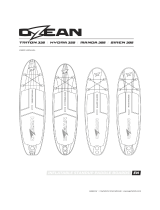
7
LEAK DETECTION AND REPAIR
Air Leak Detection
If the board is losing air pressure, not caused by lower temperature, check the
board for leaks, starting with the valves. A leaking valve is rare, but if you do find
a leak, we recommend that you tighten it with the included wrench. To locate a
leak, we recommend mixing soap and water in a spray bottle, spray around the
valve. If you see bubbles forming, check your valve seating and base and be
sure the valve insert is screwed tight. If you continue to have problems, please
contact us.
If the board is losing air and the valves are good, it probably has a small
puncture. Small punctures can be repaired easily and permanently. Spray
around the board until air bubbles become visible and mark the position of the
leak. If you do not find air bubbles, inflate the board to maximum air pressure
and try to listen to find the leak, if you can narrow the area down, return with a
spray bottle to identify the source of the leak.
Repair Kit
Punctures less than 1/8” in size can be repaired simply without a patch. Deflate
your board, then clean and dry the area to be repaired. Apply a small drop of
glue to cover the puncture, and let it dry 12 hours.
If your board needs repair,use the patches in the repair kit and follow these
steps:
Deflate the board completely, lay it flat and wait for it to dry.
Cut a patch that is 2 inches larger than the tear/rip all the way around.
Use alcohol to clean the repair area.
Apply three coats of adhesive to the patch and the board. Wait 5 minutes in
between each coat.
Place the patch over the tear/rip. The adhesive will react quickly, so make sure
the positioning is precise/accurate. Use the roller to ensure the patch lays flat
and even.
Wait 24 hours before re-inflating the board.











